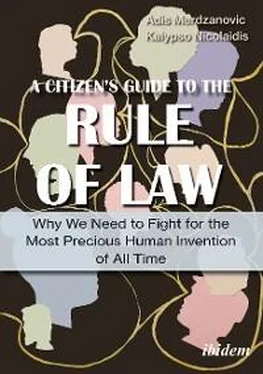ibidem-Press, Stuttgart
Table of Contents
Foreword: It’s the Rule of Law, Stupid!
Chapter 1. Saving the Rule of Law
What is the Rule of Law then?
A simple magic trick
Ask not (only) what it can do for you…
…also ask what you can do for the Rule of Law!
Coming up next
Chapter 2. When rule of law meets EU accession
The Twin Imperatives for the Western Balkans
Negotiating accession
Establishing legitimacy
What the Rule of Law is and why it matters
Going deep: Love and everyday gestures
Rule by Law and Rule of Law
“Liberal democracy”—beyond the buzzword
Fighting emperor Palpatine
What the people cannot decide
Chapter 3. Rule of Law Promotion, EU-style
Enlargement postponed or when Jean-Claude killed the mood
Reviving the relationship: the EU enlargement strategy
On the importance of being lawful
Recognise the problem and commit to solving it
Why elites don’t like the rule of law
“Do as I say, not as I do”—Intra-EU problems with the rule of law
A gospel with no sinners
Between nukes and lawyers
The Importance of Being ROLF
Chapter 4. The Fundamental Dilemma of EU Rule of Law Promotion
Achieving Sustainability or Why Inconsistency Ruins Progress
Why consistency matters—and why it’s hard to achieve sometimes
Educating the Student
Promoting rule of law in the accession process
When the EU assesses the rule of law
Why rule of law promotion is more than the sum of its parts
Problem 1: Too much focus on institutions
Problem 2: Too much focus on political elites and state structures
Problem 3: Too much focus on means rather than ends
Reframing the issue: The rule of law promotion dilemma
The “second generation” of rule of law reform
Towards a better approach for rule of law promotion: the dilemma
Chapter 5. Taking on the rule of law dilemma by being more ambitious
Why?
Qui Bono
Don’t be shy!
Outsiders can be right
How?
From the laws on the books….
…to the institutions of justice….
…to politics and power structures…
… to, ultimately, socio-cultural realities
From the laws on the books to law in action
Chapter 6. Taking on the rule of law dilemma by being humbler
Why?
Contestability of interpretations
Diversity of national traditions
National autonomy
How?
Towards an ends-based approach
Two logics
Chapter 7. Promoting the Rule of Law in practice: the “Living List”
Conditionality revisited
Success cases? The Priebe Reports on North Macedonia and Bosnia-Herzegovina
The citizens’ “living list”
Five citizen-based principles to monitor the rule of law
The “living list” in practice
Towards a new strategy
Chapter 8. Conclusion
Foreword: It’s the Rule of Law, Stupid!
The rule of law really matters. But like oxygen, we only know it when it is missing. In fact, we hope to convince our readers in these pages that it is the most precious human invention of all time, pervading our daily lives. When we buy something in the shop, when we pay our rent, when we meet each other for a chat in a pub, or when we march in protest, we trust in the rule of law to protect us from governmental overreach, mafia godfathers, or the will of the majority in our society. As we take the rule of law for granted, we fail to see when it’s under attack. And under attack it is around the world.
Indeed, the rule of law may be blatantly mocked and trampled in places far from Europe, from Hong Kong to Venezuela, or in its neighbourhood, from Ankara to Algiers. But, rule-of-lawlessness has also become a European disease.
This book is written in Europe, by two Europeans, with a focus on what is going on in Europe, both in the European Union and in countries aspiring to become members. But we hope that the book is relevant beyond Europe and beyond the challenges of EU enlargement. We will discuss developments in some specific countries in this book, but neither in detail not in the necessary depth these cases would deserve. Our goal is to explore the rule of law and its contemporary challenges, not to discuss the intricacies of any particular circumstances of its breach.
Why is this ‘a citizen’s guide’? Because we explore this state of affairs from the point of view of citizens; citizens who want to understand what it is, why it is under attack, why this matters to them and what they can do about it.
If you care about freedom in our age but do not care for abstract jargon, this book is for you. While taking the issues seriously, we try to treat them with some levity so as to make concepts accessible and practicable. Throughout the book, we have added explanations of some important concepts in side boxes, which are meant as much to amuse as to explain.
We speak to rule of law newcomers as well professionals, bureaucrats, and NGO activists and NGO activists, who are already engaged in this field and have done so much to defend the rule of law. Above all, we offer this book to any citizen curious about the meaning of this seemingly technical term and perhaps, hopefully, wishing to spread the word.
The book draws in part on a 2012 publication prepared for the EU at the behest of the OECD and we are grateful to its co-author, Rachel Kleinfeld, for her contribution at the time. 1Here, we have both substantially updated and broadened the initial perspective by exploring the current context which has heightened its demise, namely the rise of illiberalism and the decline of democracy in the Western Balkans and beyond. The book also assesses some positive steps taken by the EU in recent years, offers further recommendations and in doing so, hopes to empower citizens who seek to resist regression and entrench progress.
We wish to thank all our friends and colleagues with whom we have discussed these ideas in the past few years. In particular, we thank Dorian Singh for her assistance in finalising the manuscript. Adis Merdzanovic wishes to thank the Swiss National Science Foundation for supporting this research. And we wish to wholeheartedly thank the team at ibidem , in particular Valerie Lange, for their patience with us, their commitment to the subject, and their support throughout the publication process.
This book is dedicated to all the fighters for the rule of law, wherever they may be.
The authors
Oxford and Zurich
January 2021
1Foreword
Kalypso Nicolaidis and Rachel Kleinfeld, “Rethinking Europe’s “rule of law” and Enlargement Agenda: The Fundamental Dilemma”, published as part of the SIGMA Papers, No. 49, OECD Publishing, 2012, republished as Jean Monnet Working Paper 12/12. NYU School of Law.
Chapter 2
Chapter 1.
Saving the Rule of Law
From Bucharest, Rome and Budapest all the way to Sarajevo, Belgrade and Priština: the rule of law is under serious attack in Europe. That’s nothing new. The rule of law is a weapon against arbitrary power, the power to confiscate our goods, our dignity, or our freedom. For centuries, although the powerful have tried to resist its entrenchment, the rule of law prevailed against the odds, because once people start to appreciate all its benefits, it is hard to take these away without some resistance.
But at the beginning of our Millennium, the rule of law appears increasingly unable to hold its ground against its countless attackers. If its defenders eventually lose this fight, the rule of law will not expire as a supernova, visible throughout the galaxy. Rather, much like the proverbial frog that keeps sitting in a constantly heating pot without realising the imminent danger, its agony will have been so gradual and unremarkable that its eventual demise would come as a surprise to most of us.
Читать дальше












